
System type: Pumped - differential control
Installed: 1995
Inspected: 2003
System not working.
Two years ago (approximately Fall/Winter 2000) there was a leak in the area of the water heater. Suspect it was from valve fitting above the water heater. Water was dripping onto water heater and I assume rusting the fitting connection areas. Client only knew that there was a leak and that she called a plumber and had the tank replaced. The plumber replaced the water heater with a smaller unit (40 gal.) and appears to have re-plumbed the collector feed and return lines into the water heater.
During the inspection, the inspector noted that the collector loop isolation valves were closed. The collector loop was bypassed. I also noted that the anti-scald valve had been left in the hot out line but that the cold in port had been plugged up. The valve was no longer receiving cold water for tempering purposes. Opened the isolation valves. I also opened the return drain port to make sure water was circulating. After about 20 seconds I heard water falling off the roof unto the ground. I went out and noted that there was a major leak in the solar collector. The leak appeared to be at a riser/header connection. It was a major burst. Without taking the cover off, I was not able to determine exactly if the burst was at the riser/header connection or whether it was from a split tube.
I then went back downstairs and isolated the collector loop.
What was wrong with this system? This is the possible scenario.
1. The client said that she had called the solar installer some time after the solar system was installed. The reason for the call was not made clear to me. The client did not seem to remember. She did recall that the solar installer came out and told her that she would have to flush the system periodically. Connect a hose to the collector loop drain valves and flush it from there. (Comment: The client is elderly and although quite alert and intelligent, this is not something that a grandmother should not have to do!) I suspect that perhaps the installer may have even disconnected the anti-scald valve at this point. This could have been the problem that she called him for. Not enough hot water.
2. In any event, after this, there was a drip from one of the valves above the tank. This resulted in causing water to pool atop the water heater which in turn led to corrosion of the inlet and outlet ports atop the water heater. Or led to causing a hole atop the water heater that in turn let water into the body of the tank causing a tank leak, etc. In any event, this dripping valve led to an eventual leak. The client stated that she did not have a problem with water running off the roof at this time. Therefore, we can assume that the collector was fine.
3. Because of the above, the tank had to be replaced. The client stated that she could not contact the solar system installer and therefore called a plumber. The plumber replaced the water heater. At this point, it is unclear whether the previous solar serviceman disconnected the anti-scald valve from the cold service line or whether the plumber did. In any event, the anti scald valve was disconnected from the cold service line. (It could have been the anti-scald valve that was leaking at the fitting and therefore either the solar installer or plumber could have disconnected it.)
4. In regards to the collector leak, there are several possibilities.
a. It appears the plumber isolated the solar system when replacing the water heater. If the plumber had isolated the collector loop without draining the collector loop and a freeze occurred after that, a tube could have burst because of this. Especially if there was no water pressure available for the freeze valve to work.
b. The plumber could have replaced the water heater and reactivated the system. The absorber could have burst due to freeze damage for numerous reasons. Lack of operation of the freeze valve, no power, lack of pressure in the line, etc.
c. The collector could have developed a leak from a faulty joint. Only taking the collector apart could really determine the problem.
In any event, this solar system is inoperative. The client does not seem to understand the system operation and is not able to provide me with information that can help develop a chronology of what occurred. I was not able to get specific information related to whether the client knew that a problem had occurred with the collector and knew that water was running off the roof. All the client seemed to know was that the plumber told her she needed a new water heater tank.
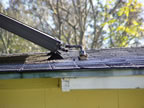 |
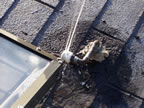 |
 |
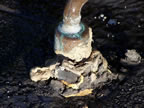 |
 |
 |
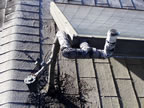 |
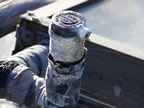 |
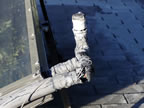 |
 |
 |
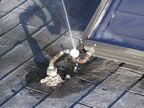 |
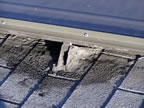 |
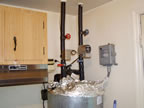 |
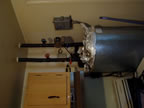 |
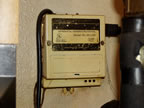 |
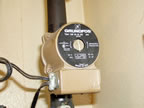 |
 |
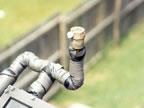 |
